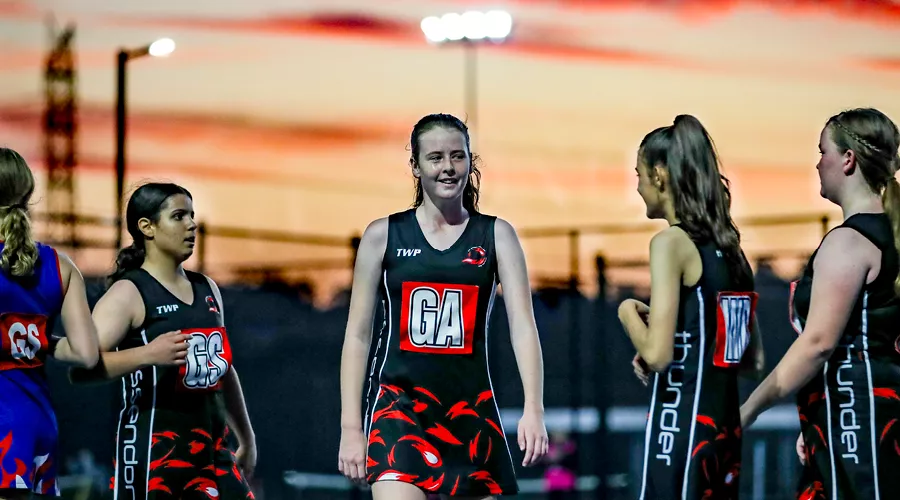You are 15 or 16 years old. You are in, or approaching, the final years of secondary school. The academic demands can feel-all consuming, and you might also be trying to squeeze in a part-time job and social catch-ups with friends. Priorities change, after all.
So either your parents suggest it, or you might decide for yourself: with study the priority, there’s no time for netball.
The question, though: should there be? And what are the potential benefits beyond the obvious health outcomes associated with regular physical activity?
Mental and social health outcomes are the other two categories referenced by Dr Helen Brown, a senior lecturer at Deakin University's Centre for Sport Research, who admits she is fascinated by the “psycho-social” side of the subject.
“Sport provides you with an avenue for social interaction, and a feeling - especially in team sports - of belonging,’’ says Dr Brown. “That’s a really important word at the moment, that we all want to feel that we’re ‘belonging’ to something and feel connected to other people.''
That has become even more crucial since COVID-19, which exacerbated feelings of isolation, but the mental health benefits are wide-ranging.
“Mastery of skills is another protective mechanism for mental health, because it’s something that you can achieve for yourself: you might not be good at other things, but you’re good at sport,'' says Dr Brown.
"So it does provide a bit of increased self-efficacy and increased self-concept. But that’s on one proviso: if you are supported and coached well.’’
Anatomy plays a part, too. Federal Government website healthdirect.gov.au says exercise can also be an aid to learning - not just because blood being pumped to the brain can help with clarity of thinking, but by increasing the size of the hippocampus, the part of the brain responsible for memory.
Dr Brown cites more than a decade of research and multiple studies that show links between outside-of-school sport and important developmental outcomes including not just friendships and connectedness, or behavioural and mental health, but also related to cognition.
Benefits cited in one 2017 study included better memory, decision-making, attention and executive function, while another conducted around the same time in US around youth risk behaviour showed adolescents who participated in one or more team sports reported higher academic achievement.
Dr Brown says that finding the right balance between work and play is crucial, and loves it when the two overlap. A maths teacher, for example, might take a class out onto the school oval, set a physical task, then get the students to analyse the heart rate data, meaning that outdoor time, movement and learning are all combined.
The academic is aware of the parental pressure to prioritise on scholastic achievement, almost at the expense of all else. “However, the research shows that sport participation is associated with positive mental health outcomes, so we should be encouraging students to be active, as well as study.
“Research shows that sport is a significant predictor of lower depression symptoms, lower perceived stress, and higher resilience, and young adults who play sport certainly rate themselves higher in mental health when they’re asked about themselves.’’
There has long been a broad and worrying drop-off in girls playing organised team sport once they reach around 14-16. Reasons include VCE studies, peer influence, body image/consciousness, lack of confidence in basic skills, a shortage of female role models and pathways and a shift towards more exercise-based, less competitive pursuits such as yoga/pilates, gym/fitness workouts and dance.
Yet Netball Victoria has been pleased to discover that the failure to return from the enforced Covid-19 break in 2019 that had been predicted turned out to not be nearly as drastic as had been feared.
NV’s General Manager Participation, Mel Taylor, describes as “a real success story” the fact that membership at the community netball level had almost returned to 2019 levels now that most competitions have resumed across the state.
“There’s a few age groups across regional and metro Victoria where people are reluctant to commit because they’re working or they’re doing Year 12 and don’t feel like they have the time to commit to a sport,’’ says Taylor.
“We understand their interest in dedicating as much time and effort as they can to that, but the research and the data shows us that having another outlet is really important.
“So we want to encourage people to think about value outside of just the physicality of playing netball - the social connections, the mental stimulation, the teamwork, the leadership skills which you gain from being involved in a team sport and see that as being a real value like maths or English.’’
Taylor stresses the relatively small time commitment involved in games with an average 40-minute duration, and netball’s flexibility with fill-ins often readily available given the sport’s grassroots popularity, plus varying season lengths and membership options based around games played.
Dr Brown also has vast experience at club and association level, and combines her Deakin work with a volunteer role as coach development manager at the Boroondara Netball Association, where her sister Sue Reddish is the president.
“It’s a perfect experience for a young girl, really,’’ says Dr Brown. “If you can get involved in a club, you can start helping to umpire, you can work in the canteen, you can volunteer to coach, you can do all these things that are actually building skills that you can use for your career later on in life.
“And it’s such a beautiful vehicle, It’s all fun, it’s social, it’s interacting, but you’re actually developing all those qualities. It’s self-improvement, without a doubt; I see all these girls blossom, and grow in confidence. So it’s that whole experience that sport can bring, rather than just playing the sport on the day.’’
Written by Linda Pearce
